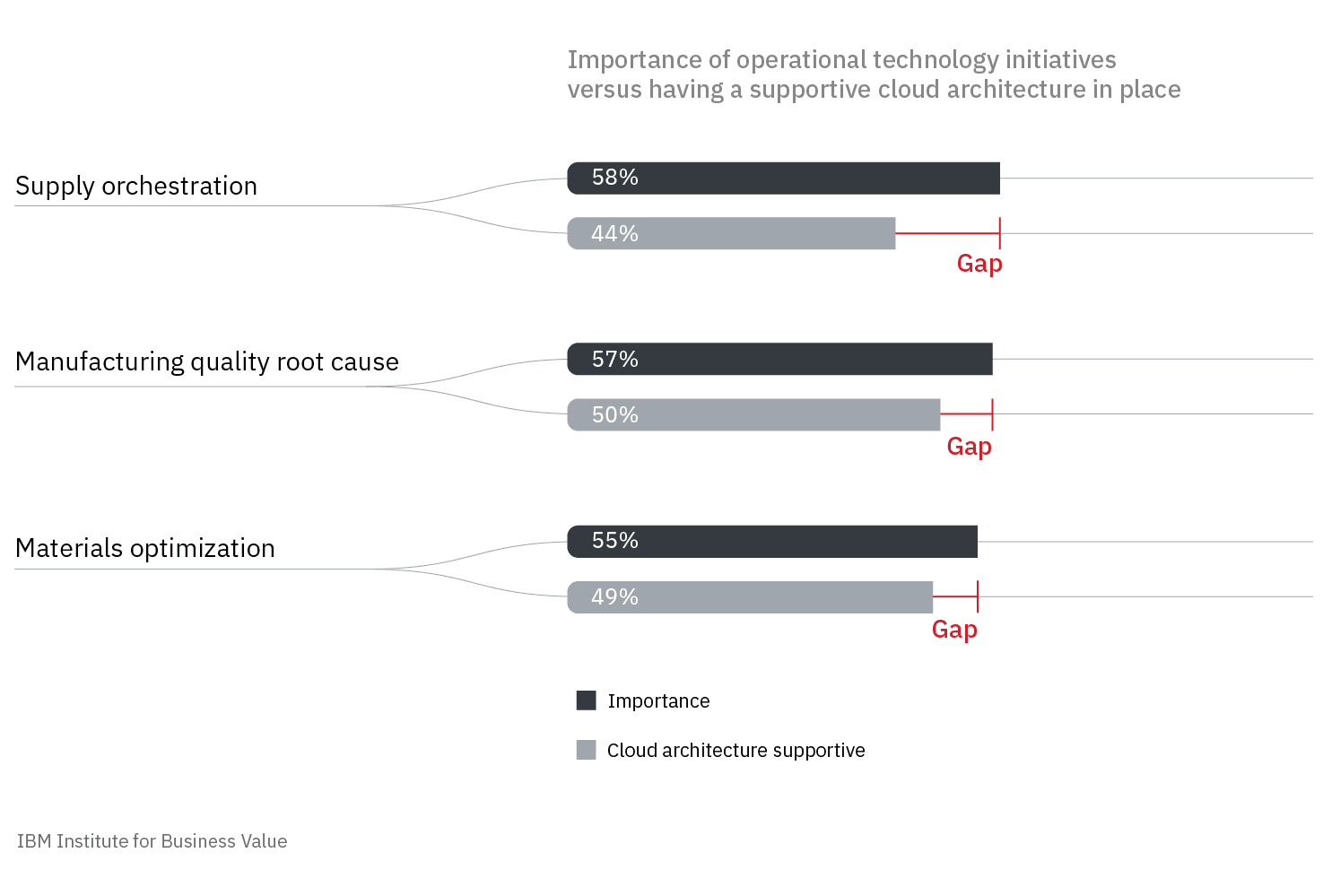Cloud-enabled manufacturing

As Industry 4.0 evolves, manufacturing organizations have been steadily embracing cloud computing, with most saying they made major progress with implementation in 2022. But recent insights from the IBM Institute for Business Value (IBM IBV) and Amazon Web Services (AWS) suggest that many manufacturing organizations may not be positioning cloud as the cornerstone for digital transformation. In our global survey of industrial manufacturers, only half of their IT executives say they are harnessing the benefits of cloud.
What is holding them back? Three reasons stand out:
- A surprisingly low number of manufacturing workloads have been migrated to the cloud, hindering advanced operational initiatives, such as automation, where cloud can be a key enabler.
- Some in the manufacturing industry lack integrated technology strategies that include cloud computing, artificial intelligence (AI), the Internet of Things (IoT), and app modernization for manufacturing processes.
- Some respondents have focused strictly on cost savings from cloud solutions versus additional outcomes, such as improving business process performance and increasing value across core manufacturing operations.
The lesson for manufacturers? Merely adopting cloud to lift-and-shift workloads or support standalone use cases is not enough. A more outcome-driven approach to cloud-based manufacturing can help them realize benefits such as boosting productivity, quality, machine availability, and sustainability, as well as accelerating engineering efforts.
Digital transformation in manufacturing demands a more strategic, value-driven approach to cloud services.
Without a new approach, manufacturing businesses will struggle to tackle complex technology-powered initiatives in the future—including supply chain orchestration, quality analysis and resolution, materials and production optimization, and predictive monitoring of assets.
In fact, executives already say their cloud architecture is inadequate to support their priorities. A weak cloud technology foundation is making it difficult for them to integrate real-time data, security, and exponential technologies to improve decision-making and power innovation.
Manufacturing executives say their cloud architecture can’t support some of their most important technology initiatives.

To explore how manufacturing organizations can advance their goals with cloud and the advanced technologies it enables, we surveyed both manufacturing and IT executives at more than 1,100 manufacturing companies worldwide. Respondents work in automotive, electronics, downstream oil and gas, chemicals, metals, and industrial machinery.
We identified a group of leaders, the Transformational Optimizers, that are positioned to outperform their peers in key performance metrics by modeling five traits:
A modern cloud platform. A hybrid cloud IT infrastructure that capitalizes on both public and private cloud solutions lets manufacturers process data where it makes the most sense.
A robust data foundation. By democratizing big data, organizations can gain deeper insights, drive operational efficiency, and boost cyber resilience.
Digital technology integration. Cloud platforms can integrate key enabling technologies, such as machine learning, AI, IoT, automation, intelligent workflows, robotics, digital twins, and more.
New ways of working. Leaders are investing in their workforce, nurturing digital and technology skills to support modern manufacturing solutions.
Business outcomes linked to cloud. By involving their finance teams, manufacturing front-runners link cloud manufacturing initiatives to quantifiable value.
Download the report to dive deeper into these attributes, including case studies that showcase work in the field. An action guide offers three steps manufacturers can take to advance their cloud journey and use emerging technologies as tools for transformation.
Meet the authors
Jose Favilla, Director, Global Industrial Sector, and Industry 4.0 Leader, IBM TechnologyZahid Habib, Vice President, Global Industrial Sector Leader, Global Energy and Resources Industry Leader, IBM Consulting
Wendy Bauer, Vice President and General Manager, Manufacturing and Automotive, Amazon Web Services
Spencer Lin, Global CFO Research Lead, IBM Institute for Business Value
Noriko Suzuki, Global Research Lead, Automotive and Electronics, IBM Institute for Business Value
Scot Wlodarczak, Head of Industrial Marketing, Amazon Web Services
Download report translations
Originally published 27 November 2023






